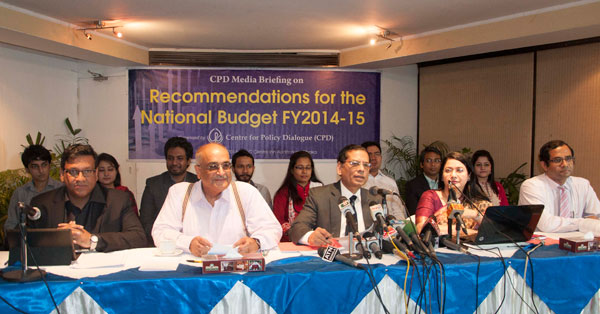The challenge of balancing resource availability with expenditure expansion
Post-Election upsurge yet to be seen
Fiscal policy package for FY15 will require consolidation of public expenditure with prudent prioritisation, an intensification of revenue mobilisation drive, and closer attention to financing of fiscal deficit with greater emphasis on foreign financing.
The expected FY15 fiscal policy measures should improve investment scenario to create an enabling environment for Bangladesh Economy to regain the momentum it lost due to political volatility during the first half of FY14.

The observations and policy recommendations emerged from “A Set of Proposals for the National Budget FY2015,” an analytical report prepared as part of the Independent Review of Bangladesh Economy (IRBD), during a media briefing on Recommendations for the National Budget FY2014-15 at the Brac Centre Inn on Sunday, 4 May 2014.
[box title=”Resources” ]A Set of Proposals for the National Budget FY2015
Presentation from the media briefing
Press reports and Editorials on the briefing
[/box]Professor Mustafizur Rahman, Executive Director, CPD mentioned that the economy was supposed to regain momentum, particularly in case of investment, following the National Election in January 2014 but it did not. In view of an assessment of macroeconomic developments in FY14, the CPD analysis came up with recommendations for macroeconomic policy stance for FY2015.
While presenting the budget proposals, Dr Fahmida Khatun, Research Director, CPD drew upon the macroeconomic scenario and a number of key areas including review of the state of investment situation and proposals towards pick-up in investment; fiscal-budgetary recommendations on issues related to the rural economy and proposals for strengthening social protection in Bangladesh.
Dr Khatun noted that along with economic correlates, there are a number of non-economic issues that need to be taken cognisance of to realise FY2015 budget proposals. The policymakers need to pay attention to the improvement of weak implementation and reform capacity of the government and weak oversight capacity of institutions belonging to the ’national integrity system’ in order for the economy to regain momentum.
CPD Distinguished Fellow Dr Debapriya Bhattacharya opined that Bangladesh’s GDP growth accelerated by one per cent each decade over the past years irrespective of who was in power but this time the trend may discontinue due to the prevailing lacklustre investment scenario in the country. He urged the government to strategise its institutional and political measures to tackle the situation for improvement.
Professor Rahman added that the government needs to make sure that the non-economic factors do not impede the potential of quality and quantity of investments from turning into economic growth.
Dr Khondaker Golam Moazzem, Additional Research Director and Mr Towfiqul Islam Khan, Research Fellow, CPD also responded to a number of queries from journalists related to taxation, the NBR and the RMG sector.
As part of the IRBD team, CPD Senior Research Associates Mr Muhammad Al Amin, Ms Khaleda Akhter, Mr Zafar Sadique and Mr Kishore Kumer Basak; Research Associates Mr Mashfique Ibne Akbar, Ms Farzana Sehrin and Mr Naimul Gani Saif; and Programme Associate Ms Shahzeen Hafiz were also present.

